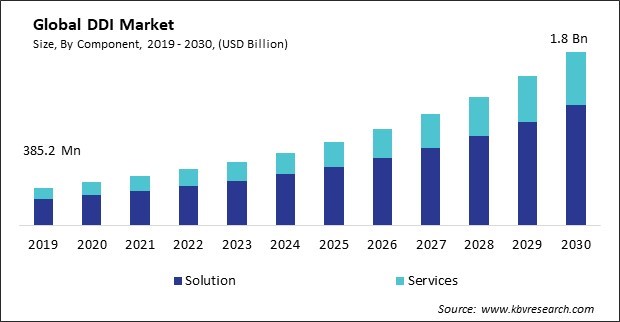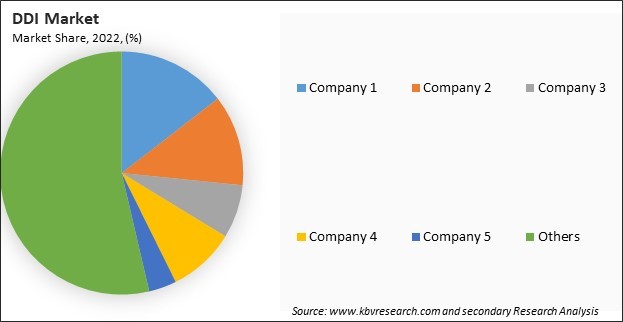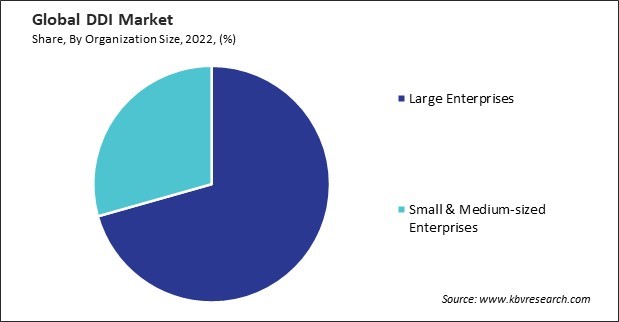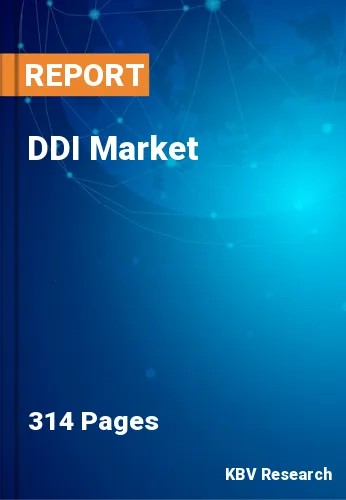“Global DDI Market to reach a market value of USD 1.8 Billion by 2030 growing at a CAGR of 15.5%”
The Global DDI Market size is expected to reach $1.8 billion by 2030, rising at a market growth of 15.5% CAGR during the forecast period.
Data center transformation often involves the adoption of hybrid cloud architectures. DDI solutions support seamless integration between on-premises data centers and cloud environments, ensuring consistent IP address management and DNS resolution across the hybrid infrastructure. Consequently, the Data center transformation segment would generate approximately 17.92% share of the market by 2030. In data center transformations involving containerization, DDI automates IP address management for containers. This ensures dynamic IP assignments for containers and supports containerized applications' seamless deployment and communication.

Internet utilization has increased significantly due to the growth of internet-connected devices, such as smart appliances, smartphones, and IoT devices. The increasing proliferation of network-connected devices necessitates the implementation of streamlined DNS and IP address administration systems to ensure uninterrupted data exchange and communication. Therefore, expanding internet usage and digital transformation propel the market's growth. Moreover, the exponential growth in internet-connected devices, from traditional computing devices to IoT devices, has led to a substantial increase in demand for IP addresses. IPAM, a key component of DDI solutions, becomes essential for efficiently managing and allocating these addresses to ensure proper connectivity. The exhaustion of IPv4 addresses has necessitated a transition to IPv6, which introduces new challenges in IP address management. Thus, the expansion of the market is propelled by the increasing need for IP address management.
However, Organizations often have well-established and complex network infrastructures with legacy systems. Integrating DDI solutions into these existing setups can be challenging, requiring careful planning and sometimes necessitating modifications to the current network architecture. Legacy DNS and DHCP systems may not seamlessly integrate with modern DDI solutions. Integrating DDI with legacy systems can result in compatibility issues, requiring additional effort to ensure a smooth transition without disruptions to ongoing network operations. Hence, complexity in implementation and integration is hindering the growth of the market.

The leading players in the market are competing with diverse innovative offerings to remain competitive in the market. The above illustration shows the percentage of revenue shared by some of the leading companies in the market. The leading players of the market are adopting various strategies in order to cater demand coming from the different industries. The key developmental strategies in the market are Acquisitions, and Partnerships & Collaborations.
Based on component, the market is bifurcated into solution and services. In 2022, the solution segment garnered the highest revenue share in the market. As organizations undergo digital transformation, there is a growing need for robust and scalable DDI solutions to manage the expanding network infrastructure. Security is a prime concern for enterprises, and DDI solutions are crucial in mitigating DNS-related threats. The solutions segment is witnessing increased demand as enterprises seek robust security features to protect against cyber threats targeting DNS infrastructure.
Based on deployment mode, the market is categorized into cloud and on-premises. In 2022, the cloud segment registered a considerable growth rate in the market. Organizations increasingly adopt cloud-native approaches, developing and deploying applications directly in cloud environments. As a result, the demand for DDI solutions that seamlessly integrate with and optimize cloud-native architectures is rising. Cloud environments offer unparalleled scalability, allowing organizations to scale their infrastructure dynamically based on demand. DDI solutions that can efficiently manage IP addresses, DNS, and DHCP services in tandem with the scalability of cloud workloads become essential for seamless operations.
On the basis of organization size, the market is divided into small & medium-sized enterprises and large enterprises. In 2022, the large enterprises procured the highest revenue share in the market. Large enterprises with expansive and dynamic networks require scalable solutions to accommodate the growing number of devices and services. DDI provides a scalable framework for managing IP addresses, DNS configurations, and DHCP settings, supporting the ever-expanding needs of large-scale networks. DDI solutions automate and streamline IP address management, allowing large enterprises to allocate and track IP addresses efficiently. This is crucial for preventing conflicts, ensuring resource optimization, and simplifying the overall management of IP address spaces.

On the basis of application, the market is segmented into network automation, virtualization & cloud, data center transformation, network security, and others. In 2022, the virtualization and cloud segment attained a noteworthy revenue share in the market. DDI facilitates the dynamic assignment of IP addresses in virtualized environments. As virtual machines (VMs) are created or moved within the virtualized infrastructure, DDI ensures seamless IP address allocation through DHCP, allowing efficient resource utilization. DDI solutions integrate with popular virtualization platforms like VMware, Hyper-V, and OpenStack. This integration enables seamless coordination between IP address management and virtualized infrastructure, ensuring consistency and reliability in network configurations.
By vertical, the market is divided into telecom & IT, BFSI, government & defense, healthcare & life sciences, education, retail, manufacturing, and others. In 2022, the telecom and IT segment registered the highest revenue share in the market. DDI solutions facilitate centralized IP address management, automating the allocation and tracking of IP addresses. This is essential in the IT and telecommunication sector to efficiently manage many devices and services requiring unique IP addresses. DDI is fundamental for managing Domain Name System (DNS) configurations. It ensures accurate resolution of domain names to IP addresses, supporting seamless communication between devices, servers, and applications in the IT and telecommunication networks.
Free Valuable Insights: Global DDI Market size to reach USD 1.8 Billion by 2030
Region-wise, the market is analyzed across North America, Europe, Asia Pacific, and LAMEA. The Asia Pacific region generated a substantial revenue share in the market in 2022. Adopting advanced technologies, cloud services, and digital initiatives has increased the need for robust DDI solutions to manage IP addresses efficiently and support evolving digital infrastructures. The Asia Pacific region has substantially increased internet usage and connectivity. This growth is driven by the rising number of users, increased mobile penetration, and the expansion of online services.
| Report Attribute | Details |
|---|---|
| Market size value in 2022 | USD 579.4 Million |
| Market size forecast in 2030 | USD 1.8 Billion |
| Base Year | 2022 |
| Historical Period | 2019 to 2021 |
| Forecast Period | 2023 to 2030 |
| Revenue Growth Rate | CAGR of 15.5% from 2023 to 2030 |
| Number of Pages | 314 |
| Number of Tables | 570 |
| Report coverage | Market Trends, Revenue Estimation and Forecast, Segmentation Analysis, Regional and Country Breakdown, Market Share Analysis, Porter’s 5 Forces Analysis, Company Profiling, Companies Strategic Developments, SWOT Analysis, Winning Imperatives |
| Segments covered | Component, Deployment Mode, Organization Size, Application, Vertical, Region |
| Country scope |
|
| Companies Included | Cisco Systems, Inc., Nokia Corporation, BlueCat Networks, Inc., (Madison Dearborn Partners), Infoblox Inc. (Warburg Pincus LLC), Microsoft Corporation, SolarWinds Corporation, NCC Group plc, PC Network Inc., FusionLayer Inc., TCPWave, Inc. |
By Component
By Deployment Mode
By Organization Size
By Application
By Vertical
By Geography
This Market size is expected to reach $1.8 billion by 2030.
Surge in internet usage and digital transformation are driving the Market in coming years, however, Complexity in implementation and integration restraints the growth of the Market.
Cisco Systems, Inc., Nokia Corporation, BlueCat Networks, Inc., (Madison Dearborn Partners), Infoblox Inc. (Warburg Pincus LLC), Microsoft Corporation, SolarWinds Corporation, NCC Group plc, PC Network Inc., FusionLayer Inc., TCPWave, Inc.
The expected CAGR of this Market is 15.5% from 2023 to 2030.
The Network Security segment is leading the Market by Application in 2022 there by, achieving a market value of $654.5 million by 2030.
The North America region dominated the Market by Region in 2022 there by, achieving a market value of $614.2 million by 2030, growing at a CAGR of 14.1 % during the forecast period.
Our team of dedicated experts can provide you with attractive expansion opportunities for your business.

 Drivers
Drivers
 Restraints
Restraints
 Opportunities
Opportunities
 Challenges
Challenges
